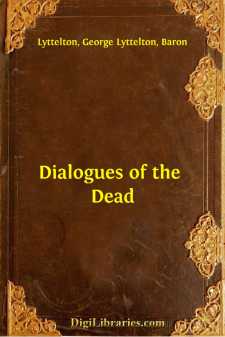Categories
- Antiques & Collectibles 13
- Architecture 36
- Art 48
- Bibles 22
- Biography & Autobiography 813
- Body, Mind & Spirit 142
- Business & Economics 28
- Children's Books 15
- Children's Fiction 12
- Computers 4
- Cooking 94
- Crafts & Hobbies 4
- Drama 346
- Education 46
- Family & Relationships 57
- Fiction 11829
- Games 19
- Gardening 17
- Health & Fitness 34
- History 1377
- House & Home 1
- Humor 147
- Juvenile Fiction 1873
- Juvenile Nonfiction 202
- Language Arts & Disciplines 88
- Law 16
- Literary Collections 686
- Literary Criticism 179
- Mathematics 13
- Medical 41
- Music 40
- Nature 179
- Non-Classifiable 1768
- Performing Arts 7
- Periodicals 1453
- Philosophy 64
- Photography 2
- Poetry 896
- Political Science 203
- Psychology 42
- Reference 154
- Religion 513
- Science 126
- Self-Help 84
- Social Science 81
- Sports & Recreation 34
- Study Aids 3
- Technology & Engineering 59
- Transportation 23
- Travel 463
- True Crime 29
Dialogues of the Dead
Categories:
Description:
Excerpt
INTRODUCTION.
George, Lord Lyttelton, was born in 1709, at Hagley, in Worcestershire. He was educated at Eton and at Christchurch, Oxford, entered Parliament, became a Lord of the Treasury and Chancellor of the Exchequer. In 1757 he withdrew from politics, was raised to the peerage, and spent the last eighteen years of his life in lettered ease. In 1760 Lord Lyttelton first published these “Dialogues of the Dead,” which were revised for a fourth edition in 1765, and in 1767 he published in four volumes a “History of the Life of King Henry the Second and of the Age in which he Lived,” a work upon which he had been busy for thirty years. He began it not long after he had published, at the age of twenty-six, his “Letters from a Persian in England to his Friend at Ispahan.” If we go farther back we find George Lyttelton, aged twenty-three, beginning his life in literature as a poet, with four eclogues on “The Progress of Love.”
To the last Lord Lyttelton was poet enough to feel true fellowship with poets of his day. He loved good literature, and his own works show that he knew it. He counted Henry Fielding among his friends; he was a friend and helper to James Thomson, the author of “The Seasons;” and when acting as secretary to the king’s son, Frederick, Prince of Wales (who held a little court of his own, in which there was much said about liberty), his friendship brought Thomson and Mallet together in work on a masque for the Prince and Princess, which included the song of “Rule Britannia.”
Before Lord Lyttelton followed their example, “Dialogues of the Dead” had been written by Lucian, and by Fenelon, and by Fontenelle; and in our time they have been written by Walter Savage Landor. This half-dramatic plan of presenting a man’s own thoughts upon the life of man and characters of men, and on the issues of men’s characters in shaping life, is a way of essay writing pleasant alike to the writer and the reader. Lord Lyttelton was at his best in it. The form of writing obliged him to work with a lighter touch than he used when he sought to maintain the dignity of history by the style of his “History of Henry II.” His calm liberality of mind enters into the discussion of many topics. His truths are old, but there are no real truths of human life and conduct, worth anything at all, that are of yesterday. Human love itself is called “the old, old story;” but do we therefore cease from loving, or from finding such ways as we can of saying that we love. Dr. Johnson was not at his wisest when he found fault with Lord Lyttelton because, in his “Dialogues of the Dead,” “that man sat down to write a book, to tell the world what the world had all his life been telling him.” This was exactly what he wished to do. In the Preface to his revised edition Lord Lyttelton said, “Sometimes a new dress may render an old truth more pleasing to those whom the mere love of novelty betrays into error, as it frequently does not only the wits, but the sages of these days. Indeed, one of the best services that could now be done to mankind by any good writer would be the bringing them back to common sense, from which the desire of shining by extraordinary notions has seduced great numbers, to the no small detriment of morality and of all real knowledge.”
At any rate, we now find it worth while to know what the world had been telling all his life to an enlightened, highly-educated man, who was an active politician in the days of Walpole and of the elder Pitt, who was a friend of Pope’s and of the best writers of the day, and who in his occasional verse added at least one line to the household words of English literature when in his warm-hearted Prologue to Thomson’s play of Coriolanus, produced after its writer’s death, he said of that poet what we may say of Lord Lyttelton himself, that he gave to the world
“Not one immoral, one corrupted thought,
One line which, dying, he could wish to blot.”
H. M.


